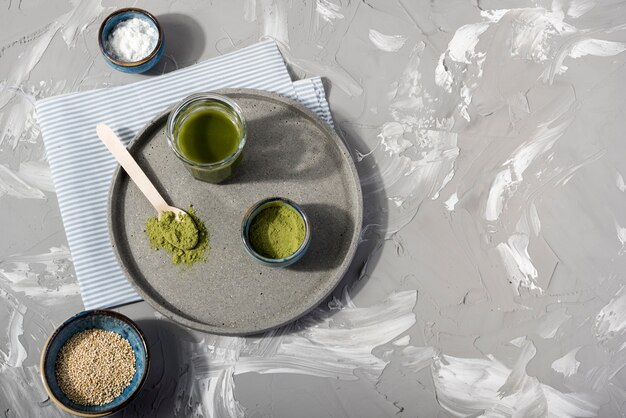
I’m not a big fan of the term “superfood,” but it fits Spirulina perfectly (it’s often used for coconut oil, too). Interestingly, you might know this impressive substance by the more familiar name: pond scum. This nutrient-rich substance is actually a type of cyanobacteria packed with health benefits. Spirulina is loaded with chlorophyll and, like plants, harnesses energy from the sun. It has many advantages, although, despite some claims, there’s no proof that it cures cancer or HIV.
Spirulina is a natural “algae” powder loaded with protein and is a rich source of antioxidants, B-vitamins, and other nutrients. When harvested from clean ponds and water bodies, it ranks among the most powerful nutrient sources available. It is primarily composed of protein and essential amino acids, making it a top recommendation for vegetarians because of its high iron content. The combination of protein and iron also makes it beneficial during pregnancy, post-surgery, or whenever your immune system needs a boost.
Although it tastes like pond scum, Spirulina shines in terms of health benefits. The dense concentration of protein and vitamins in Spirulina has earned it the reputation of being the “most nutrient-dense food on the planet.” Compared gram for gram with other foods, it’s a powerhouse of nutrients, providing a healthy dose of vitamins B-1, B-2, B-3, B-6, B-9, C, D, A, and E. It also contains minerals like potassium, calcium, chromium, copper, iron, magnesium, manganese, phosphorus, selenium, sodium, and zinc, as well as beneficial pigments.
A key note to remember: despite some claims, Spirulina isn’t an effective Vitamin B12 source for humans. It contains a form of B12 known as pseudovitamin B12, which our bodies can’t absorb or use.
Spirulina is made up of 65% protein and amino acids, including gamma linolenic acid (GLA), known for its anti-inflammatory properties. GLA is typically hard to find in foods and usually needs to be synthesized by the body. Spirulina is one of the few foods naturally rich in GLA, which is further supported by its Omega 3, 6, and 9 fatty acid contents.
Research indicates Spirulina might help regulate blood sugar levels and could be as effective as some diabetes medications. It can lower blood sugar and manage HbA1c levels, a long-term indicator of blood glucose.
Antioxidants protect cells from damage, and Spirulina is an excellent natural source. The standout antioxidant in Spirulina is phycocyanin, which is a powerful anti-inflammatory agent.
Spirulina might also be useful for those with allergies because it reduces inflammation related to nasal congestion and related symptoms. People taking Spirulina have noticed less congestion, itching, and sneezing.
Additionally, Spirulina can bind to heavy metals in the body, helping to eliminate them. It’s extremely high in chlorophyll, which aids in detoxifying the blood and boosting the immune system. A study showed that taking 500 milligrams of Spirulina daily, along with zinc, significantly reduced arsenic toxicity.
There’s emerging evidence suggesting Spirulina might bind radioactive isotopes, which could be important for those undergoing radiation therapy or exposed to radioactivity.
Spirulina is also known to enhance fat burning during exercise, thanks to its high antioxidant content, which can help reduce muscle fatigue and improve muscle gain.
However, people with phenylketonuria (PKU) should check with a doctor before trying Spirulina since it contains that amino acid. Those on blood thinners should also consult a doctor, and it may not be recommended for pregnant or nursing women or those with autoimmune diseases.
This algae is incredibly nutritious but also quite costly. One ounce of Spirulina contains much more than the usual daily intake, making it pricey compared to dairy or meat protein.
While Spirulina is different from Chlorella, they do share some similarities as they are both types of algae.
I have used several reputable sources for Spirulina after careful research. If you’re interested in learning more about the benefits of Spirulina and Chlorella, there’s a Wellness Mama podcast with Catharine Arnston from EnergyBits that’s worth checking out.
Have you tried Spirulina? What did you think of it? Will you give it a go? Let us know!

